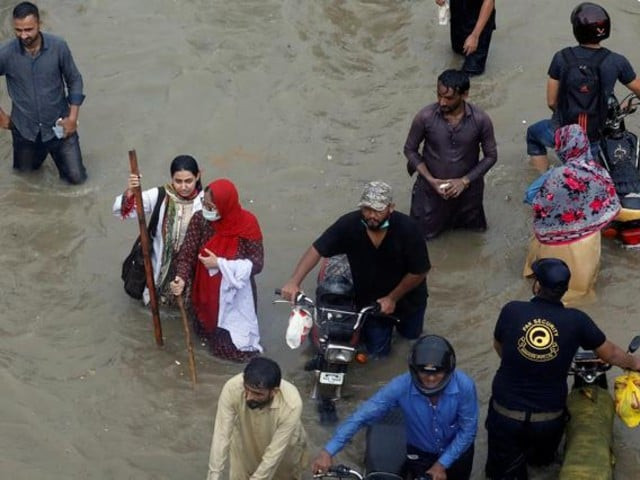Rains and spread of infectious diseases
What measures can be taken to combat risks of developing typhoid fever?

Typhoid is a serious infectious disease caused by the bacteria, Salmonella Typhi, and is typically transmitted through contaminated food and water in areas with poor sanitation.
Climatic variability, especially like that created by the current heavy rainfall season in Pakistan creates a high risk of the spread of typhoid infection along with other infectious diseases, and children are the most susceptible to this pathogen.
Symptoms of typhoid include fever, vomiting, stomach pain, loss of appetite, headache, cough, diarrhea and constipation; and the disease can be fatal if left untreated. There are an estimated 21 million cases of the disease and 222,000 deaths every year in the developing world due to typhoid.
There has been an ongoing outbreak of typhoid fever (multiple drug resistant strain) in Pakistan since November 2016 which was first identified in the city of Hyderabad with a noticeably increasing rate of hospital admissions of children being infected with this highly contagious superbug during the month of July; and the situation is still prevailing.
The purpose of this article is to evoke awareness among our population about the disease so that possible measures can be taken to prevent its spread during these vulnerable weather conditions. Moreover, it is to raise awareness among parents about the symptoms so that they may take prompt action and take their child to a physician in time, in order to prevent complications that may arise due to negligence and ignoring simple symptoms of Typhoid fever.
Decades ago, Salmonella Typhi strains were treated remarkably with simple antibiotics like ceftriaxone at a much lower cost with full recovery from this infection.
An emergence of the unusual strain of same bacterium was discovered years later, which was unresponsive to the usual antibiotics. Scientists conducted researches involving genomic sequencing studies and discovered the multiple drug resistant (MDR) strain of Salmonella Typhi, which does not respond to conventional antibiotics because it has now acquired a genetic change that mediates resistance to oral antibiotics like ceftriaxone, ampicillin, chloramphenicol and co-trimoxazole. Instead it now responds to advanced antibiotics like azithromycin and remaining alternatives intravenous antibiotics like imipenem.
However, a point to be noted is that typhoid is preventable by taking simple measures, of which we should be aware given that we are already facing a pandemic and we should make efforts to prevent outbreaks of such communicable diseases that increase during flooding and rainy seasons.
What measures can be taken to combat risks of developing typhoid fever? Effective infrastructure outside the health system is a must, like: go for water treatment (i.e. always drink boiled water/or treated with chlorine); always wash your hands before eating, preparing and serving food; always wash fruit and vegetables before you eat; avoid eating unhygienically cooked food; maintain hygiene like cutting the nails of young children; keep foods and drinks covered at all times; use clean containers for storing food; maintain hygiene of restrooms and proper disposal of fecal matter; keep the home and overall environment clean, to avoid flies; and dispose rubbish in properly constructed trash bins.
These all are easily implementable measures which can be taken at an individual level especially during these days when water is contaminated in every home. This will highly reduce the burden of this life-threatening disease among our paediatric population who are at a higher risk.
To add, this season is associated with other water-borne illnesses besides typhoid, hence maximum hygiene practices should be employed these days.
Published in The Express Tribune, August 30th, 2020.
Like Opinion & Editorial on Facebook, follow @ETOpEd on Twitter to receive all updates on all our daily pieces.
















COMMENTS
Comments are moderated and generally will be posted if they are on-topic and not abusive.
For more information, please see our Comments FAQ